八种时态练习题 + 六种基本句型翻译训练
- 格式:doc
- 大小:78.50 KB
- 文档页数:10
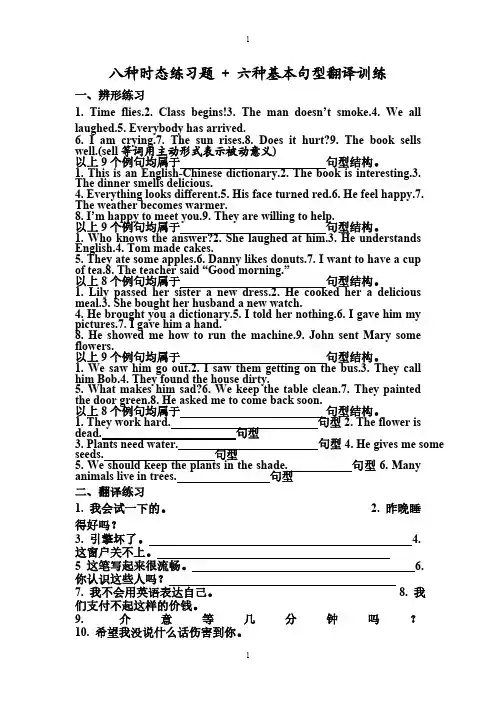
二. 用所给词的适当形式填空:1. He__________swimming in the river every day in summer. (go)2. It________you are right. ( seem )3. Look, the children______________ basketball on the playground. ( play )4. He________________to the radio when I came in, ( listen )5. It is very cold .I think it_____________ . ( rain )6. ---I need some paper.---I_____________ some for you. ( bring )7. I can’t find my pen. Who_____________it? (take )8. He said that he________________back in five minutes . ( come )9. I didn’t meet him. He_____________ when I got there. ( leave )10. I______________my bike, so I have to walk to school. ( lose )11. He____________down and began to read his newspaper. ( sit )12.He is very hungry. He_______________ anything for three days. ( not eat )13.I____________with you if I have time . ( go )14.We will go to the cinema if it____________fine . (be )15.I will tell her the news when she_____________to see me next week. (come)16. ---When__________you_________the car? ---In 1998. (buy )17. We_____________ good friends since we met at school . (be)18. What______you______ at five yesterday afternoon ? (do)19. The bike is nice . How much______it______? (cost)20. The boy is happy because he ___________(sell) out all the newspapers.21.The plan ________________(give) up because of rain.22.If it __________(not rain) tomorrow, we ____________(go )fishing.23.Where ____________you____________(be) these days? 24.Where is Tom? He _________(go) to the post office. He said he _________(come) back soon.25.Mike says he _________(want )to be a worker after he _________ (finish )school.26.The last bus _______just ________(leave) when they ________(get) to the bus stop.27.She _________(not go) to bed until she _______(finish) her work.28.Light ___________(travel )much faster than sound.29.I __________(feel) much better after I _______(take) the medicine. 30.“ Where ________we________(meet)?”“Let’s meet outsidethe park gate.”31.I_________(be) afraid Mr. Johnson __________(not visit) our school tomorrow.32.I _________(lost) my bike ._________you _________(see) it anywhere?33.________this kind of car __________(produce) in Shanghai? 34.We __________(see) several members of the family since we ________(arrive)35.I found that the students _________(play) football on the playground.36.The shop ___________(close) at this time of day.37. ——They say there’s a new restaurant nearby.——Yes, and it _________________ (be)open for no more than a week.38.________the doctor __________(send) for last night?39.Jim with his parents __________(visit) the Great Wall the day after tomorrow.40.Some children ________________(take ) good care by the nurse. 41.Some new houses _____________(build) by the villagers themselves.42.What language _____________(speak) in Australia?43.The colour TV _____________(buy) in that shop three days ago. 44.He said he __________(stay) here for another two days. 45.The doctor said Jim must ________(operate ) on at once.46. “__________the bridge _______ (repair) yet? “Yes, theworkers______ already______ (repair) it.”47.We are in Grade One this year, so we ________________(teach ) physics next year.48.“Where _________(be) you last night?”“I_________(ask) to help Tom at home”49.The big tree ________(blow)down in the storm last night.50.I________ never ________(eat) such delicious noodles before. 51.When we reached the town, it _______(get) dark.52.We ________(have) lunch when suddenly someone knocked at the door.53.Lucy said she ________(visit) the school the next month.54.I ________(wait) until he comes back.55.You ________(watch) TV after supper, aren’t you?56.They _________(be) to that small village several times.57.Can you tell me if it _________(snow) tomorrow?58.Could you tell me if you _________(read) the story book? 59.He said the lights in the room _________(go) out when he opened the door.60. I _________(be) fifteen soon.61.Tom, your aunt _______(come) this afternoon .62.My teacher often _________(tell) us not to play on the street. 63.They________(plant) trees on the hill. Do you see?64.The teacher said that the earth ________(move) round the sun. 65.She said she _______(put) on a new coat the next day.66.The Great Wall _________(know) all over the world.67.Could you tell me where Alice ________ (live)?68.________the film ______(show) many times since last Sunday. 69.________the street lights usually _______(turn) on at seven in summer evening?70.I _______(not go) to the cinema because I ________(see) the film before.71.It ________(get) dark. What about ________(go) home at once? 72.You ________(be) late if you __________(not hurry).73.Use your head and you _________(find) a better way. 74.Look!Someone ________(lie) on the floor.75.It __________(rain) harder now. It ________(rain) quite often in summer.76.Here _______(come) the bus.77.I don’t know when the manager ________(return), but when be _________(come) back, I _________(let) you know. 78.“Where ________(be) you this time yesterday?”“I________(be) at home. I _______(go) over my lessons then.”79. ___________Tom often __________ (play) chess after school?80. David _____________ (wash) his face and_______ (brush) his teeth every morning.81. What time _________We _________ (leave) tomorrow?82. If you__________ (not hurry), you__________(be)late for the meeting.83. My mother ____________(not do) housework yesterday.84. ________ your father __________ (go) to work every day last year?三. 用英语翻译下列句子:85. 我走近花园时,几个男孩子在爬树。
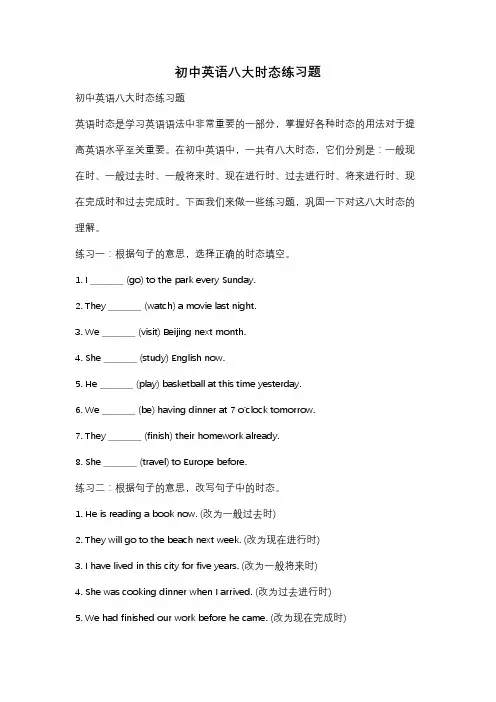
初中英语八大时态练习题初中英语八大时态练习题英语时态是学习英语语法中非常重要的一部分,掌握好各种时态的用法对于提高英语水平至关重要。
在初中英语中,一共有八大时态,它们分别是:一般现在时、一般过去时、一般将来时、现在进行时、过去进行时、将来进行时、现在完成时和过去完成时。
下面我们来做一些练习题,巩固一下对这八大时态的理解。
练习一:根据句子的意思,选择正确的时态填空。
1. I ________ (go) to the park every Sunday.2. They ________ (watch) a movie last night.3. We ________ (visit) Beijing next month.4. She ________ (study) English now.5. He ________ (play) basketball at this time yesterday.6. We ________ (be) having dinner at 7 o'clock tomorrow.7. They ________ (finish) their homework already.8. She ________ (travel) to Europe before.练习二:根据句子的意思,改写句子中的时态。
1. He is reading a book now. (改为一般过去时)2. They will go to the beach next week. (改为现在进行时)3. I have lived in this city for five years. (改为一般将来时)4. She was cooking dinner when I arrived. (改为过去进行时)5. We had finished our work before he came. (改为现在完成时)6. They have been studying English since morning. (改为过去完成时)7. He is going to the concert tomorrow. (改为将来进行时)8. I played soccer with my friends yesterday. (改为一般现在时)练习三:根据句子的意思,用正确的时态填空。
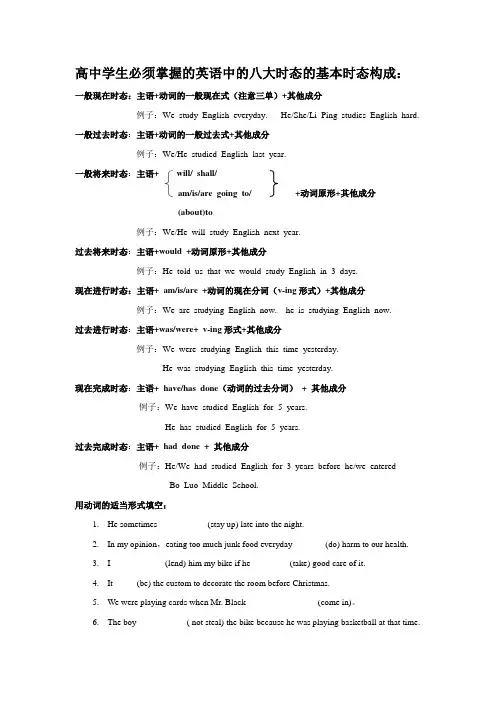
高中学生必须掌握的英语中的八大时态的基本时态构成:一般现在时态:主语+动词的一般现在式(注意三单)+其他成分例子:We study English everyday. He/She/Li Ping studies English hard. 一般过去时态:主语+动词的一般过去式+其他成分例子:We/He studied English last year.一般将来时态:主语+ will/ shall/am/is/are going to/ +动词原形+其他成分(about)to例子:We/He will study English next year.过去将来时态:主语+would +动词原形+其他成分例子:He told us that we would study English in 3 days.现在进行时态:主语+ am/is/are +动词的现在分词(v-ing形式)+其他成分例子:We are studying English now. he is studying English now.过去进行时态:主语+was/were+ v-ing形式+其他成分例子:We were studying English this time yesterday.He was studying English this time yesterday.现在完成时态:主语+ have/has done(动词的过去分词)+ 其他成分例子:We have studied English for 5 years.He has studied English for 5 years.过去完成时态:主语+ had done + 其他成分例子:He/We had studied English for 3 years before he/we enteredBo Luo Middle School.用动词的适当形式填空:1.He sometimes ___________(stay up) late into the night.2.In my opinion,eating too much junk food everyday _______(do) harm to our health.3.I ____________(lend) him my bike if he_________(take) good care of it.4.It _____(be) the custom to decorate the room before Christmas.5.We were playing cards when Mr. Black ________________(come in)。
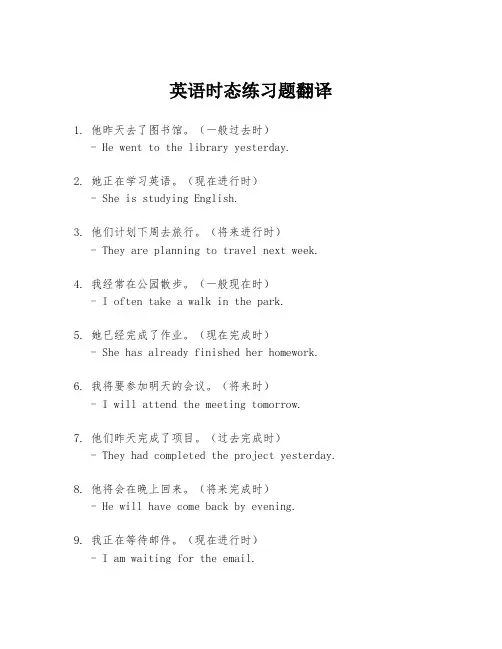
英语时态练习题翻译1. 他昨天去了图书馆。
(一般过去时)- He went to the library yesterday.2. 她正在学习英语。
(现在进行时)- She is studying English.3. 他们计划下周去旅行。
(将来进行时)- They are planning to travel next week.4. 我经常在公园散步。
(一般现在时)- I often take a walk in the park.5. 她已经完成了作业。
(现在完成时)- She has already finished her homework.6. 我将要参加明天的会议。
(将来时)- I will attend the meeting tomorrow.7. 他们昨天完成了项目。
(过去完成时)- They had completed the project yesterday.8. 他将会在晚上回来。
(将来完成时)- He will have come back by evening.9. 我正在等待邮件。
(现在进行时)- I am waiting for the email.10. 他昨天没有来,因为他生病了。
(过去进行时)- He didn't come yesterday because he was sick.11. 她将会在明天之前完成报告。
(将来完成时)- She will have finished the report by tomorrow.12. 他们正在讨论会议的安排。
(现在进行时)- They are discussing the meeting arrangements.13. 我刚刚完成了我的工作。
(现在完成时)- I have just finished my work.14. 他将会在周末之前完成这项工作。
(将来完成时)- He will have completed this work by the weekend.15. 我将要开始学习新的课程。
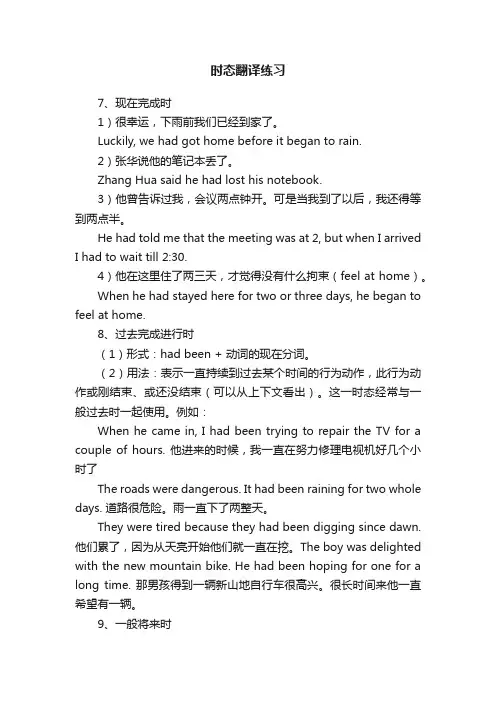
时态翻译练习7、现在完成时1)很幸运,下雨前我们已经到家了。
Luckily, we had got home before it began to rain.2)张华说他的笔记本丢了。
Zhang Hua said he had lost his notebook.3)他曾告诉过我,会议两点钟开。
可是当我到了以后,我还得等到两点半。
He had told me that the meeting was at 2, but when I arrived I had to wait till 2:30.4)他在这里住了两三天,才觉得没有什么拘束(feel at home)。
When he had stayed here for two or three days, he began to feel at home.8、过去完成进行时(1)形式:had been + 动词的现在分词。
(2)用法:表示一直持续到过去某个时间的行为动作,此行为动作或刚结束、或还没结束(可以从上下文看出)。
这一时态经常与一般过去时一起使用。
例如:When he came in, I had been trying to repair the TV for a couple of hours. 他进来的时候,我一直在努力修理电视机好几个小时了The roads were dangerous. It had been raining for two whole days. 道路很危险。
雨一直下了两整天。
They were tired because they had been digging since dawn. 他们累了,因为从天亮开始他们就一直在挖。
The boy was delighted with the new mountain bike. He had been hoping for one for a long time. 那男孩得到一辆新山地自行车很高兴。
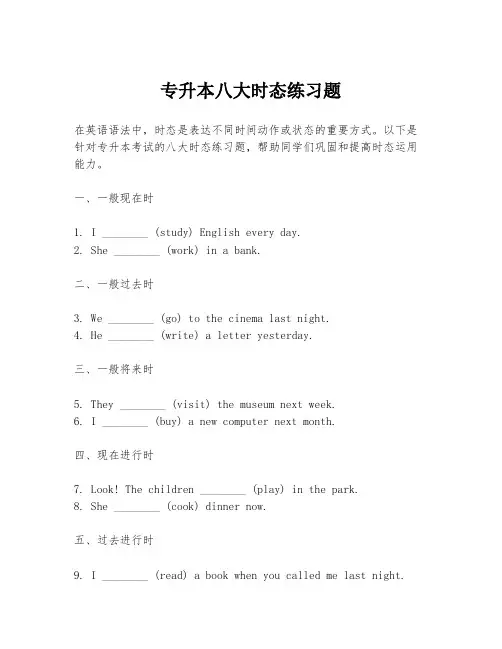
专升本八大时态练习题在英语语法中,时态是表达不同时间动作或状态的重要方式。
以下是针对专升本考试的八大时态练习题,帮助同学们巩固和提高时态运用能力。
一、一般现在时1. I ________ (study) English every day.2. She ________ (work) in a bank.二、一般过去时3. We ________ (go) to the cinema last night.4. He ________ (write) a letter yesterday.三、一般将来时5. They ________ (visit) the museum next week.6. I ________ (buy) a new computer next month.四、现在进行时7. Look! The children ________ (play) in the park.8. She ________ (cook) dinner now.五、过去进行时9. I ________ (read) a book when you called me last night.10. They ________ (discuss) the project when the boss came in.六、现在完成时11. I ________ (finish) my homework already.12. She ________ (live) in this city for ten years.七、过去完成时13. We ________ (arrive) at the airport before the flighttook off.14. He ________ (study) French before he went to France.八、将来完成时15. By the end of this year, he ________ (work) here for five years.16. By the time she gets home, we ________ (finish) dinner.答案1. study2. works3. went4. wrote5. will visit6. will buy7. are playing8. is cooking9. was reading10. were discussing11. have finished12. has lived13. had arrived14. had studied15. will have worked16. will have finished通过这些练习题,同学们可以检验自己对八大时态的掌握情况。
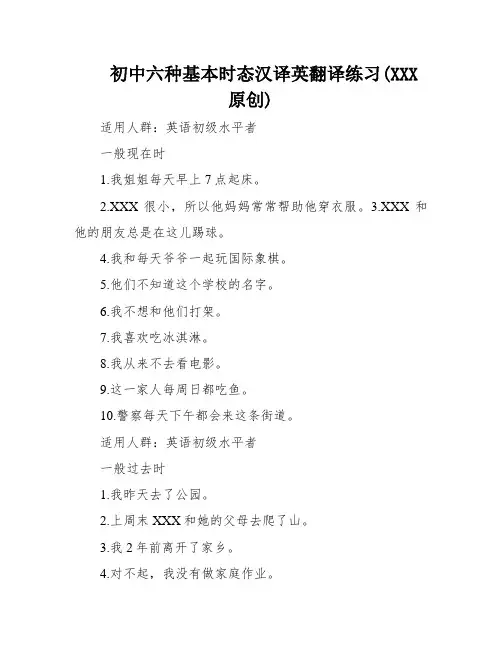
初中六种基本时态汉译英翻译练习(XXX原创)适用人群:英语初级水平者一般现在时1.我姐姐每天早上7点起床。
2.XXX很小,所以他妈妈常常帮助他穿衣服。
3.XXX和他的朋友总是在这儿踢球。
4.我和每天爷爷一起玩国际象棋。
5.他们不知道这个学校的名字。
6.我不想和他们打架。
7.我喜欢吃冰淇淋。
8.我从来不去看电影。
9.这一家人每周日都吃鱼。
10.警察每天下午都会来这条街道。
适用人群:英语初级水平者一般过去时1.我昨天去了公园。
2.上周末XXX和她的父母去爬了山。
3.我2年前离开了家乡。
4.对不起,我没有做家庭作业。
5.他和他爸爸上周末玩了一整天篮球。
6.去年这个房子是XXX家的,但是他们把它卖给了一个上海人。
7.我认为你昨天做了一件正确的事。
8.他的校服脏了,所以他今天没穿。
9.去年夏天,他们的数学老师结婚了。
10.XXX的弟弟弄坏了这个书桌的一条腿。
适用人群:英语初级水平者一般未来时1.我们下周就要放假了。
2.他的手机马上就要坏了。
3.我待会就给我妈妈发一条短信。
4.这个班级本周六将举办一个足球比赛。
5.不要做梦了。
那些人永远也不会帮助你的。
6.我下周六要和我妈妈去购物。
我们要买衣服和XXX.他们不会把自己的好机会给你的。
你应该寻找别的办法。
8.十天之后我们的店就要关闭了。
欢迎你们来买便宜的鞋和包。
9.你永远也不会知道这个秘密的。
10.谁将会成为中国?适用人群:英语初级水平者目前举行时1.听!鸟儿正在唱歌。
2.爷爷奶奶正在公园里散步。
3.你可以去和他交谈了,他正在那边吃午饭。
4.黄金的价格正在升高。
你应该快点去买一些。
5.我们正在一天天长大,XXX正在一天天变老。
6.XXX早退了。
目前,他正在路上奔驰。
7.谁正在教室里唱歌?8.他是不是正在学日语?9.这电影太差了,没人在认真看。
10.所有的老师都正在开会呢。
适用人群:英语初级水平者曩昔举行时1.我昨天下午2点正在家做作业。
2.他们去年这个时候正在故乡卖生果。
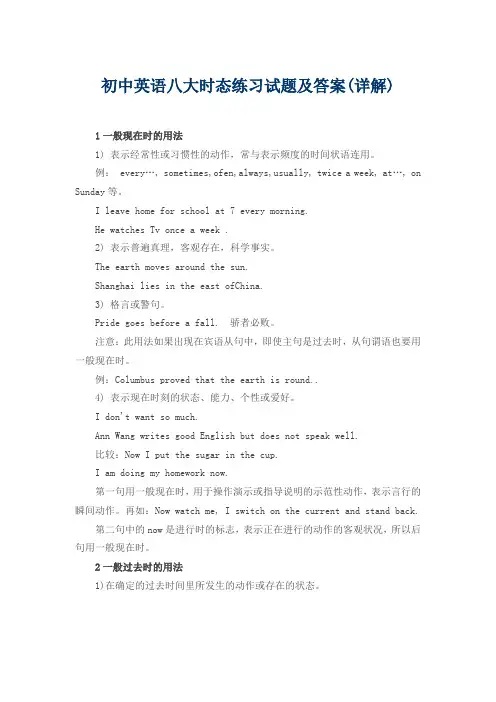
初中英语八大时态练习试题及答案(详解)1一般现在时的用法1) 表示经常性或习惯性的动作,常与表示频度的时间状语连用。
例: every…, sometimes,ofen,always,usually, twice a week, at…, on Sunday等。
I leave home for school at 7 every morning.He watches Tv once a week .2) 表示普遍真理,客观存在,科学事实。
The earth moves around the sun.Shanghai lies in the east ofChina.3) 格言或警句。
Pride goes before a fall. 骄者必败。
注意:此用法如果出现在宾语从句中,即使主句是过去时,从句谓语也要用一般现在时。
例:Columbus proved that the earth is round..4) 表示现在时刻的状态、能力、个性或爱好。
I don't want so much.Ann Wang writes good English but does not speak well.比较:Now I put the sugar in the cup.I am doing my homework now.第一句用一般现在时,用于操作演示或指导说明的示范性动作,表示言行的瞬间动作。
再如:Now watch me, I switch on the current and stand back.第二句中的now是进行时的标志,表示正在进行的动作的客观状况,所以后句用一般现在时。
2一般过去时的用法1)在确定的过去时间里所发生的动作或存在的状态。
时间状语有:yesterday, an hour ago, the other day, in 1982,yesterday morning (afternoon, evening…),last night (week, month, year…), a moment ago , a week ago, three years ago…just now,等。
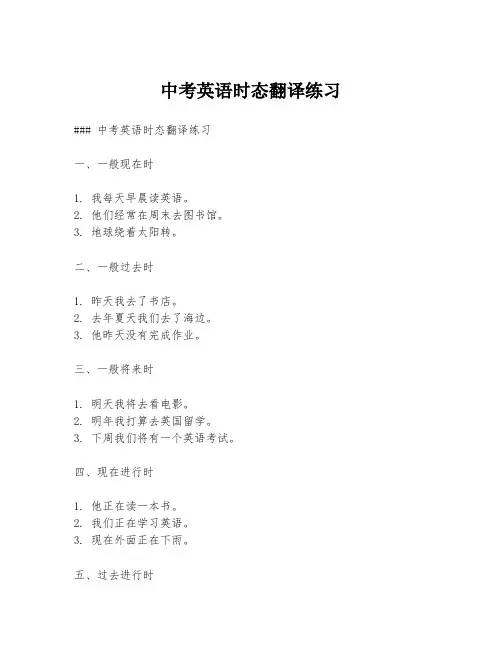
中考英语时态翻译练习### 中考英语时态翻译练习一、一般现在时1. 我每天早晨读英语。
2. 他们经常在周末去图书馆。
3. 地球绕着太阳转。
二、一般过去时1. 昨天我去了书店。
2. 去年夏天我们去了海边。
3. 他昨天没有完成作业。
三、一般将来时1. 明天我将去看电影。
2. 明年我打算去英国留学。
3. 下周我们将有一个英语考试。
四、现在进行时1. 他正在读一本书。
2. 我们正在学习英语。
3. 现在外面正在下雨。
五、过去进行时1. 昨天晚上我正在看电视。
2. 当我到达时,他们正在吃饭。
3. 昨天下午我正在图书馆学习。
六、现在完成时1. 我已经完成了作业。
2. 他们已经去过中国。
3. 他刚刚完成了他的报告。
七、过去完成时1. 我到达时,电影已经结束了。
2. 他来之前,我已经做了大部分工作。
3. 到去年为止,他已经学了五年英语。
八、将来完成时1. 到明天这个时候,我将已经完成了我的项目。
2. 明年这个时候,我们将已经完成了所有的课程。
3. 到年底,我们将会已经实现了我们的目标。
九、现在完成进行时1. 他一直在学习英语,已经学了三年了。
2. 我们一直在努力工作,已经取得了一些进展。
3. 她一直在等待消息,已经等了几个小时了。
十、过去完成进行时1. 他一直在学习,直到考试结束。
2. 他们一直在工作,直到项目完成。
3. 我一直在读书,直到我累了。
练习答案一、一般现在时1. I read English every morning.2. They often go to the library on weekends.3. The Earth revolves around the Sun.二、一般过去时1. I went to the bookstore yesterday.2. We went to the seaside last summer.3. He didn't finish his homework yesterday.三、一般将来时1. I am going to watch a movie tomorrow.2. I plan to study in the UK next year.3. We will have an English exam next week.四、现在进行时1. He is reading a book.2. We are studying English.3. It is raining outside now.五、过去进行时1. I was watching TV last night.2. They were having dinner when I arrived.3. I was studying in the library yesterday afternoon.六、现在完成时1. I have finished my homework.2. They have been to China.3. He has just finished his report.七、过去完成时1. The movie had ended by the time I arrived.2. I had done most of the work before he came.3. He had been learning English for five years by last year.八、将来完成时1. By this time tomorrow, I will have finished my project.2. By this time next year, we will have completed all our courses.3. By the end of the year, we will have achieved our goals.九、现在完成进行时1. He has been learning English for three years.2. We have been working hard and have made some progress.3. She has been waiting for the news for several hours.十、过去完成进行时1. He had been studying until the exam was over.2. They had been working until the project was completed.3. I had been reading until I was tired.。
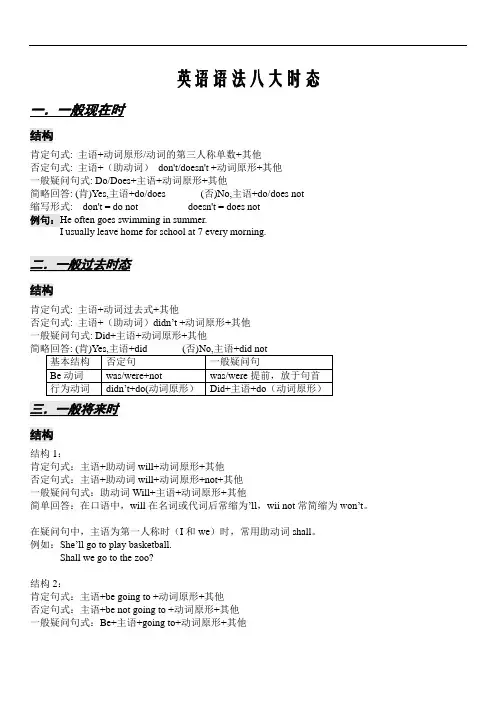
英语语法八大时态一.一般现在时结构肯定句式: 主语+动词原形/动词的第三人称单数+其他否定句式: 主语+(助动词)don't/doesn't +动词原形+其他一般疑问句式: Do/Does+主语+动词原形+其他简略回答: (肯)Yes,主语+do/does (否)No,主语+do/does not缩写形式: don't = do not doesn't = does not例句:He often goes swimming in summer.I usually leave home for school at 7 every morning.二.一般过去时态结构肯定句式: 主语+动词过去式+其他否定句式: 主语+(助动词)didn’t +动词原形+其他一般疑问句式: Did+主语+动词原形+其他基本结构否定句一般疑问句Be动词was/were+not was/were提前,放于句首行为动词didn’t+do(动词原形)Did+主语+do(动词原形)三.一般将来时结构结构1:肯定句式:主语+助动词will+动词原形+其他否定句式:主语+助动词will+动词原形+not+其他一般疑问句式:助动词Will+主语+动词原形+其他简单回答:在口语中,will在名词或代词后常缩为’ll,wii not常简缩为won’t。
在疑问句中,主语为第一人称时(I和we)时,常用助动词shall。
例如:She’ll go to play basketball.Shall we go to the zoo?结构2:肯定句式:主语+be going to +动词原形+其他否定句式:主语+be not going to +动词原形+其他一般疑问句式:Be+主语+going to+动词原形+其他简略回答:(肯)Yes,主语+be (否)No,主语+be not将来时其他表示法1)be going to表示将来表示说话人的打算、计划、安排或根据迹象判断必然或很可能发生的事情。
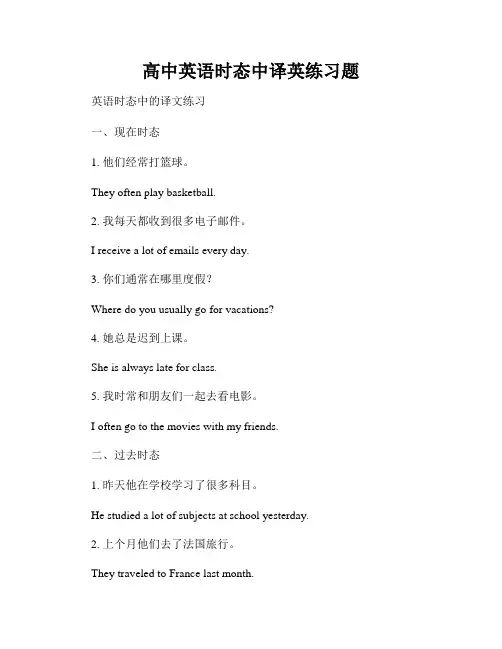
高中英语时态中译英练习题英语时态中的译文练习一、现在时态1. 他们经常打篮球。
They often play basketball.2. 我每天都收到很多电子邮件。
I receive a lot of emails every day.3. 你们通常在哪里度假?Where do you usually go for vacations?4. 她总是迟到上课。
She is always late for class.5. 我时常和朋友们一起去看电影。
I often go to the movies with my friends.二、过去时态1. 昨天他在学校学习了很多科目。
He studied a lot of subjects at school yesterday.2. 上个月他们去了法国旅行。
They traveled to France last month.3. 我小时候常常在爷爷奶奶家过夜。
I used to spend the night at my grandparents' house when I was a child.4. 她昨天晚上看了一部很有趣的电影。
She watched an interesting movie last night.5. 他们在上个周末举办了一场盛大的派对。
They had a grand party last weekend.三、将来时态1. 我明天会去超市买些食物。
I will go to the supermarket tomorrow to buy some food.2. 下个月我们将会搬到新的城市。
We will move to a new city next month.3. 她马上就要结婚了。
She is getting married very soon.4. 明年夏天你们会去哪里度假?Where will you go for vacation next summer?5. 下周我将会参加一个重要的会议。
初中英语必考八大时态详解(后附练习题与答案)初中英语必考的八大时态包含:一般现在时、一般过去时、一般将来时、过去将来时、现在进行时、过去进行时、现在完成时、过去完成时。
这八大时态是英语学习的必备知识,也是初中阶段英语必考考点,今日小达老师为您详细解读这八种时态的概念与用法,后附初中英语八大时态练习题(含答案)。
一般现在时1、概念:表示经常发生的情况;有规律出现的情况;总是发生的;事实真理。
2.时间状语:Always, usually, often, sometimes, every week (day, year, month…), once a week (day, year, month…), on Sundays (on Mondays…), etc.3.基本结构:主语+动词原形(如主语为第三人称单数,动词上要改为第三人称单数形式)4.否定形式:主语+am / is / are+not+其他;此时态的谓语动词若为行为动词,则在其前加don't,如主语为第三人称单数,则用doesn't,同时还原行为动词。
5.一般疑问句:把 be 动词放于句首;用助动词 do 提问,如主语为第三人称单数,则用 does,同时,还原行为动词。
eg:①It seldom snows here. 这里很少下雪。
②He is always ready to help others. 他总是乐于帮助别人。
③Action speaks louder than words. 事实胜雄辩。
一般过去时1.概念:过去某个时间里发生的动作或状态;过去习惯性、经常性的动作、行为。
2.时间状语:ago,yesterday,the day before yesterday,last week,last (year,night,month…), in 1989, just now, at the age of 5, one day, long long ago, once upon a time,etc.3.基本结构:主语+动词的过去式或 be 的过去式+名词4.否定形式:主语+was / were+not+其他;在行为动词前加didn't,同时还原行为动词。
八大时态练习题八大时态练习题时态是语法中一个非常重要的概念,它能够帮助我们表达不同的时间和动作状态。
在英语中,有八种不同的时态,分别是一般现在时、一般过去时、一般将来时、现在进行时、过去进行时、将来进行时、现在完成时和过去完成时。
这些时态在不同的语境中有着不同的用法,下面我们来练习一些典型的时态应用题。
1. 一般现在时A: What time (you/get) up every morning?B: I (get) up at 7 o'clock.2. 一般过去时A: When (you/visit) your grandparents last week?B: I (visit) them on Sunday.3. 一般将来时A: What time (the movie/start) tonight?B: The movie (start) at 8 o'clock.4. 现在进行时A: What (you/do) right now?B: I (watch) TV.5. 过去进行时A: What (you/do) at this time yesterday?B: I (study) for my exam.6. 将来进行时A: What (you/do) this time tomorrow?B: I (work) on a project.7. 现在完成时A: How many books (you/read) so far this year?B: I (read) ten books.8. 过去完成时A: By the time I arrived, they (already/leave).B: Oh no, I (miss) them.这些练习题涵盖了八种不同的时态,让我们更好地理解和掌握它们的用法。
一般现在时用于描述经常性的动作或事实,一般过去时用于过去发生的动作或事情,一般将来时用于表示将来的动作或计划,现在进行时用于描述正在进行的动作,过去进行时用于过去某个时间正在进行的动作,将来进行时用于描述将来某个时间正在进行的动作,现在完成时用于描述过去发生的动作对现在造成的影响,过去完成时用于描述过去某个时间之前已经完成的动作。
英语时态翻译练习题### English Tenses Translation Exercises1. Past Simple Tense (一般过去时)- 中文原句:昨天我去了图书馆。
- 英文翻译: I went to the library yesterday.2. Present Simple Tense (一般现在时)- 中文原句:她每天早晨跑步。
- 英文翻译: She runs every morning.3. Past Continuous Tense (过去进行时)- 中文原句:昨天下午我正在写报告。
- 英文翻译: I was writing a report yesterday afternoon.4. Present Continuous Tense (现在进行时)- 中文原句:他们现在正在开会。
- 英文翻译: They are having a meeting now.5. Future Simple Tense (一般将来时)- 中文原句:明天我将去购物。
- 英文翻译: I will go shopping tomorrow.6. Past Perfect Tense (过去完成时)- 中文原句:他到达时,会议已经结束了。
- 英文翻译: The meeting had ended by the time he arrived.7. Present Perfect Tense (现在完成时)- 中文原句:我已经完成了我的作业。
- 英文翻译: I have completed my homework.8. Future Perfect Tense (将来完成时)- 中文原句:到明年这个时候,我将已经学会了法语。
- 英文翻译: By this time next year, I will have learned French.9. Present Perfect Continuous Tense (现在完成进行时)- 中文原句:他一直在学习英语,已经三年了。
英语初二下八大时态练习题一、时态基础知识回顾在英语中,时态是主要用来表示动作或状态发生的时间的一种语法形式。
英语中常用的时态包括以下八种:1. 一般现在时 (Simple Present Tense):表示经常性、习惯性的行为或真理。
2. 一般过去时 (Simple Past Tense):表示过去某个时间发生的动作或情况。
3. 一般将来时 (Simple Future Tense):表示将来某个时间要发生的动作或情况。
4. 现在进行时 (Present Continuous Tense):表示现在正在进行的动作。
5. 过去进行时 (Past Continuous Tense):表示过去某个时间正在进行的动作。
6. 将来进行时 (Future Continuous Tense):表示将来某个时间正在进行的动作。
7. 现在完成时 (Present Perfect Tense):表示过去某个时间开始的动作一直延续到现在或刚刚结束的情况。
8. 过去完成时 (Past Perfect Tense):表示过去某一时间或动作在过去某一时间之前完成。
二、练习题1. 他通常和朋友们一起去图书馆学习。
2. 我们昨天在一家餐厅吃晚饭。
3. 明天我会打电话给你。
4. 她现在正在和家人一起观看电影。
5. 他昨晚七点钟正在给他的母亲打电话。
6. 我们下个周末会去海边度假。
7. 我已经完成我的家庭作业了。
8. 昨天晚上他已经到达了巴黎。
三、答案1. He usually goes to the library to study with his friends.2. We had dinner at a restaurant yesterday.3. I will call you tomorrow.4. She is watching a movie with her family now.5. He was calling his mother at 7 o'clock last night.6. We will go to the beach for vacation next weekend.7. I have finished my homework.8. He had arrived in Paris last night.以上是英语初二下学期八大时态的练习题和答案,希望对你的学习有所帮助!。
初中英语8种时态分类练习1.一般过去2.一般现在。
现在进行4一般将来5过去进行6现在完成7过去完成8过去将来一般过去时专练( )1. The mother asked the boy _______ down the ladder, but he went on _______ instead.A. come; climbingB. to come; to climbC. to come; climbingD. coming; climbing( )2. The teacher asked the students to close the windows _______ the wind from _______ the papers away.A. to stop; blowingB. stopping; blowingC. to stop; blowD. stopped; blow( )3. The sick man stayed in bed, _______ very terrible.A. feltB. feelingC. is feelingD. was feeling( )4. Yesterday I heard a story _______ by my friend.A. toldB. tellingC. to tellD. tell( )5. The boy was made _______ there for an hour by his father.A. standingB. standC. to standD. stands( )6. I saw him _______ into the small store.A. wentB. goingC. to goD. has gone( )7. He raised his voice to make everybody in the room ______ him clearly.A. hearB. to hearC. hearingD. heard( )8. Our geography teacher told us yesterday that the earth _______ around the sun.A. was movingB. movedC. has movedD. moves( )9. Oh, it’s you. I’m sorry I _______ know you _______ here.A. don’t; areB. didn’t; areC. didn’t; wereD. don’t; were( )10. Mr LuXun died in 1936. He _______ a lot of famous novels.A. wroteB. was writingC. has writtenD. would write( )11. --- How was your weekend on the farm?--- Great! We _______ with the farmers.A. enjoy ourselvesB. went fishingC. will workD. make friends( )12. --- What did Mr Jones do before he moved here?--- He _______ a city bus for over twenty-five years.A. is drivingB. droveC. has drivenD. drives( )13. Jane _______ a new dress every month when she was in Shanghai.A. buysB. is buyingC. boughtD. will buy( )14. --- Liu Mei can’t come tonight.--- Why? But she _______ me she would come.A. tellsB. toldC. is toldD. had told( )15. He turned off the light and then _______.A. leavesB. has leftC. will leaveD. left一般过去时专练1-5 CABAC 6-10 BADCA 11-15 BBCBD一般现在时与现在进行时专练( ) 1. Father usually ______ his newspaper after dinner.A. readB. readsC. readingD. is reading( ) 2. The Blacks often ______ to the cinema on Saturday evenings.A. goB. goesC. is goingD. are going( ) 3.Look! The boy ______ with his mother in the pool.A. is swimmingB. is swimmingC. are swimmingD. are swiming( ) 4.--- What is Tom doing in the classroom? --- He ______ something on the blackboard.A. drawsB. drawC. is drawingD. are drawing.( ) 5.Old Tom usually ______ up at six and ______ sports in the garden.A. gets, dosB. gets, doesC. get, doesD. gets, do( ) 6. It’s ten o’clock and Jack ______ still(仍然) ______ his homework.A. is, doB. is, doingC. are, doD. are, doing( ) 7. The waiters ______ to work at five every morning.A. startB. startsC. startingD. are starting( ) 8.I ______ a letter, so I can’t go out with you.A. is writingB. am writingC. am writeingD. am writting( )9.A hundred days _____ quite a long time.A. isB. areC. haveD. has( )10. --______ late for the meeting next time. –Sorry, I won’t.A. Don’tB. Don’t beC. Won’t beD. Be not( )11. My mother _____ noodles, but my father ______.A. likes, doesn’tB. don’t like, doC. likes, didn’tD. didn’t like, do( )12. The picture ______ nice.A. looksB. is lookedC. lookD. is looking( )13. The students will go to the Summer Palace if it ______ tomorrow.A. don’t rainB. doesn’t rainC. won’t rainD. isn’t rain( )14. We are always ready _______ others.A. to helpingB. to helpC. helpD. helping( )15. I often hear her ______ about the boy.A. talkingB. talkC. to talkD. talked( )16. He’s already a little weak in Chinese, ______ he ?A. isB. isn’tC. hasD. hasn’t( )17.Potatoes are ______ in the field by the farmers.A. growB. growingC. grownD. grew( )18. Does she have a watch? – Yes, she ______.A. haveB. doC. hasD. does( )19. She _____ English very much now.A. is likingB. likesC. likedD. is teaching( )20. She has no paper to _____ . Why not give her some?A. writeB. be writingC. write onD. write in()21. Does Mr Know-all know ______ keys?A. to makeB. how to makeC. how makeD. making( )22. Does your mother ______ English now?A. teachesB. teachC. taughtD. is teaching( )23. Jack usually ______ mistakes last term. But this term he does better.A. makesB. madeC. doesD. did( )24. The boy is too young, please ______ carefully.A. look after himB. look him afterC. look at himD. look him at( )25. She ______ you to come to my birthday party.A. hopesB. wishesC. wantD. lets( )26. --Where is Frank now? -- He ______ his bike in the yard.A. fixes upB. fixing upC. is fixing upD. fixed( )27. Bob often ______ his mother with the housework on Sundays.A. helpB. helpingC. helpsD. helped( )28. The students will go to the Summer Palace if it ______ tomorrow.A. don’t rainB. doesn’t rainC. won’t rainD. isn’t rain( )29. If it _____ tomorrow, I will go by car.A. rainB. will rainC. rainsD. would rain( )30. --What a nice garden! –She ______ it every day.A. is cleaningB. has cleanedC. cleansD. clean( )31. --Where is Peter? -- He ______ his homework in the room.A. is doingB. doesC. didD. do( )32. The teacher told us that light ______ much faster than sound.A. travelsB. traveledC. wasD. will be( )33. My mother told us that Taiwan ______ part of China.A. isB. areC. wasD. were( )34. Do you know bananas _____ in Hainan?A. growsB. is grownC. grewD. are grown( )35. The clothes ______very soft.A. are feltB. are feelingC. feelD. feels( )36. The supermarket is far from Mary’s house. So she _____ only once a week.A. goes shoppingB. has been thereC. was shoppingD. has gone there ( )37. Don’t make so much noise. We _____ to the music.A. are listeningB. listenC. listenedD. have listened( )38. I’ll go swimming with you if I _____ free tomorrow.A. will beB. shall beC. amD. was( )39. – Oh, Mrs. King, your sweater looks nice. Is it _____ wool ?-- Yes, and it’s _____ Inner Mongolia.A. made of, made byB. made of, made inC. made by, made forD. made by, made from一般现在时与现在进行时专练1-5BAACB 6-10BABAB 11-15AABBB 16-20 BCDBC21-25 BBBAC 26-30 CCBAC 31-35 AAABC 36-39 AACB3.一般将来时专练( )1. Her hope _______ the 2008 Olympic Games.A. to take part inB. is to take part inC. taking part inD. will take part in ( )2. --- Can I go to Beijing for my holiday, Dad? --- You can when you _______ a bit older.A. will getB. getC. are gettingD. got( )3. If he _______harder, he will catch up with us soon.A. studyB. studiesC. will studyD. studied( )4. --- Don’t forget to ask him to write to me.--- I won’t. As soon as he _______, I’ll ask him to write to you.A. will comeB. cameC. comesD. is coming( )5. --- Jimmy is leaving for a holiday.--- Really? Where _______ he _______?A. has; goneB. will; goC. did; goD. would; go( )6. Frank _______ to see his grandma if he _______ free tomorrow.A. will come; will beB. comes; isC. will come; isD. comes; will be( )7. There _______ a talk on science in our school next Monday.A. will giveB. will beC. is going to giveD. is( )8. --- Shall we go shopping now?--- Sorry, I can’t. I _______ my shirts.A. washB. washesC. washedD. am washing( )9. I believe that those mountains _______ with trees in a few years’ time.A. are coveredB. will be coveredC. are coveringD. will cover( )10. It is said that about 400 cars _______ in the factory next month.A. were producedB. will produceC. are producedD. will be produced( )11. --- Are you free this afternoon?--- No. I’ll have an English composition _______ this afternoon.A. to writeB. wroteC. to be writingD. to be written( )12. --- Come back home every month.--- I _______.A. willB. mustC. shouldD. can( )13. A robot _______ think of itself; it _______ be told what to do.A. can’t; mustB. couldn’t; canC. may not; willD. mustn’t, may一般将来时专练1-5 BBBCB 6-10 CBDBD 11-13 AAA4.过去进行时专练二、用动词的适当形式填空。
一、一般现在时:概念:经常、反复发生的动作或行为及现在的某种状况。
时间状语:always, usually, often, sometimes, every week (day, year, month…), once a week, on Sundays, etc.基本结构:①be动词;②行为动词否定形式:①am/is/are+not;②此时态的谓语动词若为行为动词,则在其前加don't,如主语为第三人称单数,则用doesn't,同时还原行为动词。
一般疑问句:①把be动词放于句首;②用助动词do提问,如主语为第三人称单数,则用does,同时,还原行为动词。
在一般现在时中,当主语是第三人称单数时,谓语动词要用第三人称单数形式,即常在动词原形后加-s或-es。
一、人称代词he, she, it是第三人称单数。
如:He likes watching TV. 他喜欢看电视。
She has lunch at twelve. 她十二点吃午餐。
It looks like a cat. 它看起来像只猫。
(口诀:I用am,you用are,is用于她他它,单数名词用is,复数名词都用are)二、单个人名、地名或称呼作主语;是第三人称单数。
如:①Han Mei looks like her mother. 韩梅看起来像她的母亲。
②Beijing is in China. 北京在中国。
③Uncle Wang often makes cakes. 王叔叔经常做蛋糕。
三、单数可数名词或"this / that / the+单数可数名词"作主语时,是第三人称单数。
如:①A horse is a useful animal. 马是有用的动物。
②This book is yours. 这本书是你的。
四、不定代词someone, somebody, nobody, everything, something等及指示代词this, that 作主语时,是第三人称单数。
八种时态练习题 + 六种基本句型翻译训练一、辨形练习1. Time flies.2. Class begins!3. The man doesn’t smoke.4. We all laughed.5. Everybody has arrived.6. I am crying.7. The sun rises.8. Does it hurt?9. The book sells well.(sell等词用主动形式表示被动意义)以上9个例句均属于句型结构。
1. This is an English-Chinese dictionary.2. The book is interesting.3. The dinner smells delicious.4. Everything looks different.5. His face turned red.6. He feel happy.7. The weather becomes warmer.8. I’m happy to meet you.9. They are willing to help.以上9个例句均属于句型结构。
1. Who knows the answer?2. She laughed at him.3. He understands English.4. Tom made cakes.5. They ate some apples.6. Danny likes donuts.7. I want to have a cup of tea.8. The teacher said “Good morning.”以上8个例句均属于句型结构。
1. Lily passed her sister a new dress.2. He cooked her a delicious meal.3. She bought her husband a new watch.4. He brought you a dictionary.5. I told her nothing.6. I gave him my pictures.7. I gave him a hand.8. He showed me how to run the machine.9. John sent Mary some flowers.以上9个例句均属于句型结构。
1. We saw him go out.2. I saw them getting on the bus.3. They call him Bob.4. They found the house dirty.5. What makes him sad?6. We keep the table clean.7. They painted the door green.8. He asked me to come back soon.以上8个例句均属于句型结构。
1. They work hard. 句型2. The flower is dead. 句型3. Plants need water. 句型4. He gives me some seeds. 句型5. We should keep the plants in the shade. 句型6. Many animals live in trees. 句型二、翻译练习1. 我会试一下的。
2. 昨晚睡得好吗?3. 引擎坏了。
4. 这窗户关不上。
5 这笔写起来很流畅。
6. 你认识这些人吗?7. 我不会用英语表达自己。
8. 我们支付不起这样的价钱。
9. 介意等几分钟吗?10. 希望我没说什么话伤害到你。
11. 布朗先生是一位工程师。
12. 他慢慢变得沉默。
13. 机器坏了。
(out of order) 14. 电视机开着。
15. 问题是你想做什么。
16. 我们决定跟着他的样子做。
(follow one’s example)17. 她给了我她的电话号码。
18. 她给我们唱了一首民俗歌曲。
(folk song)19. 告诉他我不在。
20. 你能告诉我格林小姐住在哪里吗?21. 我叫James给我买些面包。
22. 他发现他的工作很无聊。
23. 我看见她在和Nancy聊天。
24. 我们以为他是个老实人。
25. 他相信她说的是事实。
26. 他看着钢琴被抬上楼。
(upstairs)27. 我认为你最好跟我们呆在一起。
28. 他觉得跟她说明这点,是他的责任。
29. 大厅里有两个女孩子在跳舞。
30. 有很多事情要做。
31. 今晚有什么活动吗?32. 这儿曾经有个电影院来着。
33. 从前,岛上住着一个渔夫。
34. 有人敲门。
35. 山顶上有座古老的寺庙。
36. 你应当努力学习。
37. 会议将持续两个小时。
38. 他不知道说什么好。
39. 他们成功地完成了计划。
40. 学校定了一条规则,开始上课时学生要起立。
高中英语复习资料—八种时态复习一. 英语八种时态复习列表比较二. 用所给词的适当形式填空:1. He__________swimming in the river every day in summer. (go)2. It________you are right. ( seem )3. Look, the children______________ basketball on the playground. ( play )4. He________________to the radio when I came in, ( listen )5. It is very cold .I think it_____________ . ( rain )6. ---I need some paper.---I_____________ some for you. ( bring )7. I can’t find my pen. Who_____________it? (take )8. He said that he________________back in five minutes . ( come )9. I didn’t meet him. He_____________ when I got there. ( leave )10. I______________my bike, so I have to walk to school. ( lose )11. He____________down and began to read his newspaper. ( sit )12.He is very hungry. He_______________ anything for three days. ( not eat )13.I____________with you if I have time . ( go )14.We will go to the cinema if it____________fine . (be )15.I will tell her the news when she_____________to see me next week. (come)16. ---When__________you_________the car? ---In 1998. (buy )17. We_____________ good friends since we met at school . (be)18. What______you______ at five yesterday afternoon ? (do)19. The bike is nice . How much______it______? (cost)20. The boy is happy because he ___________(sell) out all the newspapers.21.The plan ________________(give) up because of rain.22.If it __________(not rain) tomorrow, we ____________(go )fishing.23.Where ____________you____________(be) these days? 24.Where is Tom? He _________(go) to the post office. He said he _________(come) back soon.25.Mike says he _________(want )to be a worker after he _________ (finish )school.26.The last bus _______just ________(leave) when they ________(get) to the bus stop.27.She _________(not go) to bed until she _______(finish) herwork.28.Light ___________(travel )much faster than sound.29.I __________(feel) much better after I _______(take) the medicine.30.“ Where ________we________(meet)?”“Let’s meet outside the park gate.”31.I_________(be) afraid Mr. Johnson __________(not visit) our school tomorrow.32.I _________(lost) my bike ._________you _________(see) it anywhere?33.________this kind of car __________(produce) in Shanghai? 34.We __________(see) several members of the family since we ________(arrive)35.I found that the students _________(play) football on the playground.36.The shop ___________(close) at this time of day.37. ——They say there’s a new restaurant nearby.——Yes, and it _________________ (be)open for no more than a week.38.________the doctor __________(send) for last night?39.Jim with his parents __________(visit) the Great Wall the day after tomorrow.40.Some children ________________(take ) good care by the nurse. 41.Some new houses _____________(build) by the villagers themselves.42.What language _____________(speak) in Australia?43.The colour TV _____________(buy) in that shop three days ago. 44.He said he __________(stay) here for another two days. 45.The doctor said Jim must ________(operate ) on at once.46. “__________the bridge _______(repair) yet? “Yes, theworkers______ already______ (repair) it.”47.We are in Grade One this year, so we ________________(teach ) physics next year.48.“Where _________(be) you last night?”“I_________(ask) to help Tom at home”49.The big tree ________(blow)down in the storm last night.50.I________ never ________(eat) such delicious noodles before. 51.When we reached the town, it _______(get) dark.52.We ________(have) lunch when suddenly someone knocked at the door.53.Lucy said she ________(visit) the school the next month.54.I ________(wait) until he comes back.55.Y ou ________(watch) TV after supper, aren’t you?56.They _________(be) to that small village several times. 57.Can you tell me if it _________(snow) tomorrow?58.Could you tell me if you _________(read) the story book? 59.He said the lights in the room _________(go) out when he opened the door.60. I _________(be) fifteen soon.61.Tom, your aunt _______(come) this afternoon .62.My teacher often _________(tell) us not to play on the street. 63.They________(plant) trees on the hill. Do you see?64.The teacher said that the earth ________(move) round the sun. 65.She said she _______(put) on a new coat the next day.66.The Great Wall _________(know) all over the world. 67.Could you tell me where Alice ________ (live)?68.________the film ______(show) many times since last Sunday. 69.________the street lights usually _______(turn) on at seven in summer evening?70.I _______(not go) to the cinema because I ________(see) the film before.71.It ________(get) dark. What about ________(go) home at once? 72.Y ou ________(be) late if you __________(not hurry).73.Use your head and you _________(find) a better way. 74.Look!Someone ________(lie) on the floor.75.It __________(rain) harder now. It ________(rain) quite often in summer.76.Here _______(come) the bus.77.I don’t know when the manager ________(return), but when be _________(come) back, I _________(let) you know. 78.“Where ________(be) you this time yesterday?”“I________(be) at home. I _______(go) over my lessons then.”79. ___________Tom often __________ (play) chess after school?80. David _____________ (wash) his face and_______ (brush) his teeth every morning.81. What time _________We _________ (leave) tomorrow?82. If you__________ (not hurry), you__________(be)late for the meeting.83. My mother ____________(not do) housework yesterday.84. ________ your father __________ (go) to work every day last year?三. 用英语翻译下列句子:85. 我走近花园时,几个男孩子在爬树。